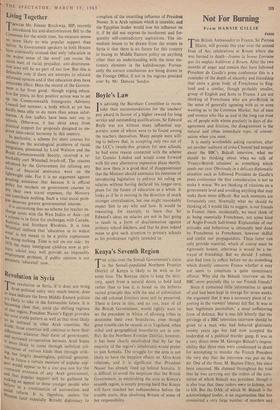Revolution in Syria
HE revolution in Syria, if it does not bring T Arab political unity very much nearer, does at least indicate the form Middle Eastern politics are likely to take in the foreseeable future. It is becoming clear that, amid the shifting regimes of that region, President Nasser's Egypt provides the most stable pattern as well as that most likely .44' be imitated in other Arab countries. No "nbt, those countries will continue to have their differences whatever their form of government, a, lid increased co-operation between Arab States ils, more likely to come through technical col- aooration of various kinds than through strik- '_ng, but largely meaningless, political gestures. But in port future a certain measure of popular sup- would appear to be a sine qua non for the continued existence of any Arab government, and that popular support will be gathered by ma Bing an appeal to those younger people who °elieve in a combination of nationalism and S,Oelal reform. It is, therefore, useless for western (and especially British) diplomacy to complain of the unsettling influence of President Nasser. It is Arab opinion which is unstable, and the Egyptian leader would lose his influence on it, if he did not express its incoherent and fre- quently self-contradictory aspirations. The im- mediate lesson to be drawn from the events in Syria is that there is no future for this country in basing its Middle Eastern policy on anything other than an understanding with the most sta- tionary elements in the kaleidoscope. Fortun- ately the correct conclusions are being drawn in the Foreign Office, if not in the regions presided over by Mr. Duncan Sandys.


































 Previous page
Previous page